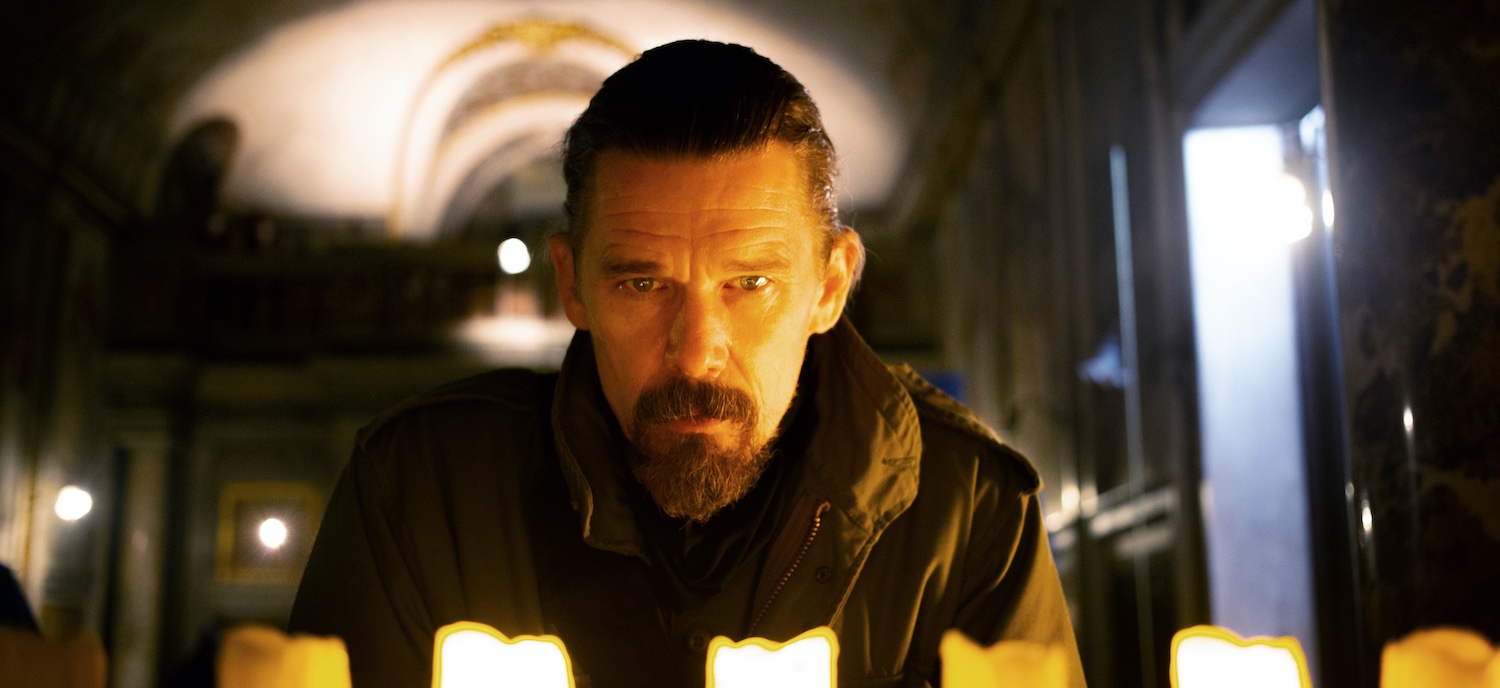What to Watch Verdict
Ferrara's determination to make something during the pandemic doesn't square with his obvious shortage of resources, and worse than that, good ideas.
Pros
- +
Ferrara has been so prolific over the last decade that a stinker like this will hardly register as a blip in his accomplishments
Cons
- -
Muddy digital cinematography by Sean Price Williams obscures everything that audiences see or care about
- -
Hawke's turn(s) as twin brothers don't add up to one convincing performance
It’s funny how so much lip service gets paid to bloated blockbusters that feel soulless and calculated to try and maximize generic audience enjoyment while the actual opposite of these get virtually ignored. I’m not talking about thoughtful, intuitive, artsy projects, but ones where filmmakers just decide to make something, anything, without quite being sure what it is or why they’re doing it. Zeros and Ones, you may guess, is one of these.
Abel Ferrara (Bad Lieutenant) is a New York filmmaking legend and indie institution. His latest is a truly awful movie, an exercise in getting out into the world and staging a production, evidently because he was determined to defy worldwide COVID-related shutdowns, whether or not he or his collaborators actually had anything to say. There is some degree of enjoyment involved in proclaiming that those opposite-pole cash grabs are garbage, but I take no joy in reporting that this is a lousy effort from a frequently great director.
Opening with an announcement from star Ethan Hawke meant to convey his excitement at the opportunity to work with Ferrara but in fact coming across like some sort of hostage video, the film follows his character JJ as he navigates the mostly empty streets of Rome in military fatigues, looking for his twin brother Justin. JJ and the people he encounters all wear masks — this was clearly shot during some of the earliest days of the pandemic — while Ferrara establishes an ambient menace that never gets explained, but has left the Eternal City as a war zone. As Ferrara is now a Rome native after relocating from his NYC stomping grounds, the filmmaker exploits his familiarity with the city’s labyrinthine streets to build a maze for JJ to navigate, but he never manages to tell him (or us) exactly what’s at the end of it.
Ferrara’s scuzzy Catholicism gets a routine workout here as the story attempts to draw wider parallels to holy wars and terrorist attacks, but the features in his style become bugs underneath the muddy digital cinematography of Sean Price Williams (Good Time, Tesla), which renders action, drama, motivation and meaning indecipherable and uninteresting. JJ’s estranged brother Justin only appears briefly, but Hawke spends a great deal of the movie behind a mask and the rest of it scowling his way through scenarios that are alternately too conventional and off the wall to fit together cohesively.
In one scene, he encounters Asian sex workers; in another, he gets forced at gunpoint to have sex on camera. The explosive conflicts that mount around the Vatican are executed with extreme closeups of digital explosions. The skirmishes that follow all feel like they’ve been staged in an empty alley that was redressed and shot from the opposite angle to create return fire.
Since his feature debut Driller Killer, Ferrara has mostly been able to merge sick, weird and wild ideas with deeper themes, testing audiences and thrilling them at the same time. King of New York and Bad Lieutenant are classics, and he got one of the few great performances out of Madonna in Dangerous Game. He’s always been prolific, but he’s made nine films and a handful of shorts since 2012, a sort of career resurgence that only a handful of people seemed to notice, which may also explain why he never started coasting. In which case, he’s earned the right to make at least a few bad movies, and anyway the law of averages practically makes at least one or two an inevitability.
Zeroes and Ones, however, feels more like a guerilla effort by a restless artist determined to make something whether or not it was ready to be made, which is why Hawke’s effusive confession at the top of it feels a bit tragic. He waited his entire career to work with Ferrara and this is what the two of them made? Sorry for you and no thanks from me.
The latest updates, reviews and unmissable series to watch and more!
That said, Hawke and Ferrara can both be forgiven; their reputations will go unharmed and hopefully this first collaboration will pave the way for more successful ones in the future. In fact, the fairest way to consider this movie is as a COVID-era stopgap, the same thing that musicians did in their houses or apartments to pass the time when they couldn’t get together with others or go out. Zeros and Ones, like most of the art that’s been created because of, inspired by and during the pandemic, seems destined to be forgotten — and ultimately that’s probably best for everyone involved.
Zeroes and Ones will release in theaters and on digital Nov. 19.
Todd Gilchrist is a Los Angeles-based film critic and entertainment journalist with more than 20 years’ experience for dozens of print and online outlets, including Variety, The Hollywood Reporter, Entertainment Weekly and Fangoria. An obsessive soundtrack collector, sneaker aficionado and member of the Los Angeles Film Critics Association, Todd currently lives in Silverlake, California with his amazing wife Julie, two cats Beatrix and Biscuit, and several thousand books, vinyl records and Blu-rays.


